One week ago today, on 21 September 2010, this journal reported on a document released by various Lithuanian embassies on the ‘Resolution of the Republic of Lithuania on Declaring the Year 2011 as the Year of Remembrance for the Victims of the Holocaust in Lithuania’ (read document here).
In addition to ‘condemning the genocide perpetrated against Jews by Nazis and their collaborators in Lithuania’ the resolution pledges itself to ‘honoring the residents of Lithuania who fought against Fascism’. [In its report, HITB naturally asked for immediate action to halt the kangaroo investigations of Holocaust Survivors who did just that; to dismantle antisemitic exhibits in state museums; and to halt the campaign for the ‘Double Genocide’ model of history in Europe.]
At the solemn September 21st ceremony at the mass murder site Ponar (Paneriai), member of parliament Emanuelis Zingeris informed the assembled diplomats, citizens and visitors that the Seimas had unanimously approved the resolution and that 2011 would be dedicated to Holocaust commemoration, a most appropriate gesture, on the 70th anniversary of 1941, when nearly all of Lithuanian Jewry was annihilated by the Nazis, with the massive participation of local nationalist forces who are on occasion glorified in modern Lithuania as ‘anti-Soviet partisan heroes’ (see e.g. the Genocide Museum’s narrative).
Many of the assembled at Ponar went away believing that the Seimas had turned a new page in the country’s perception of its Holocaust history.
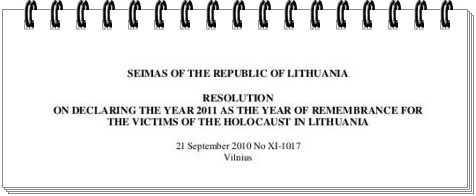
But today, one week later, September 28th, the Seimas announced the following ‘slightly revised’ version of its plan for the focus of 2011: ‘Parliament announces 2011 as year of freedom defense, memory of great losses in Lithuania’ (as per the text of BNS’s report in English here). The parliament’s own official statement is here; full English translation here, with the corrected English title: ‘Year of Commemoration of the Defense of Freedom and Great Losses’.
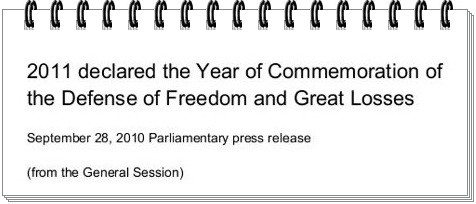 Frankly, there is unease in the Jewish community as to whether this title and text leave open the possibility that the LAF (Lithuanian Activist Front) and PG (Provisional Government), both massively complicit in the early stages of the Lithuanian Holocaust, are going to be celebrated as ‘defenders of freedom’ (or anti-Soviet patriots) during the 2011 seventieth anniversary of events unleashed by Hitler’s invasion of 22 June 1941.Continue reading
Frankly, there is unease in the Jewish community as to whether this title and text leave open the possibility that the LAF (Lithuanian Activist Front) and PG (Provisional Government), both massively complicit in the early stages of the Lithuanian Holocaust, are going to be celebrated as ‘defenders of freedom’ (or anti-Soviet patriots) during the 2011 seventieth anniversary of events unleashed by Hitler’s invasion of 22 June 1941.Continue reading
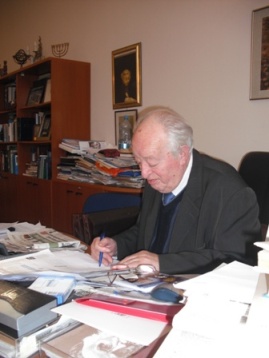
 Švenčioneliai, interwar Poland’s Nowo-Święciany). Such is the custom every year on the first Sunday in October, to remember the eight thousand Jewish civilians murdered there after a gruesome ten days of imprisonment, deprivation of basic human needs, and torture, in makeshift barracks here at the site, in October 1941. The eight thousand Jews were marched (with the lame and the old transported on wagons) from their hometowns in the area to the site on September 27th. They were all shot over a two-day period on the 7th and 8th of October 1941.
Švenčioneliai, interwar Poland’s Nowo-Święciany). Such is the custom every year on the first Sunday in October, to remember the eight thousand Jewish civilians murdered there after a gruesome ten days of imprisonment, deprivation of basic human needs, and torture, in makeshift barracks here at the site, in October 1941. The eight thousand Jews were marched (with the lame and the old transported on wagons) from their hometowns in the area to the site on September 27th. They were all shot over a two-day period on the 7th and 8th of October 1941.
 Frankly, there is unease in the Jewish community as to whether this title and text leave open the possibility that the LAF (Lithuanian Activist Front) and PG (Provisional Government), both massively complicit in the early stages of the Lithuanian Holocaust, are going to be celebrated as ‘defenders of freedom’ (or anti-Soviet patriots) during the 2011 seventieth anniversary of events unleashed by Hitler’s invasion of 22 June 1941.
Frankly, there is unease in the Jewish community as to whether this title and text leave open the possibility that the LAF (Lithuanian Activist Front) and PG (Provisional Government), both massively complicit in the early stages of the Lithuanian Holocaust, are going to be celebrated as ‘defenders of freedom’ (or anti-Soviet patriots) during the 2011 seventieth anniversary of events unleashed by Hitler’s invasion of 22 June 1941.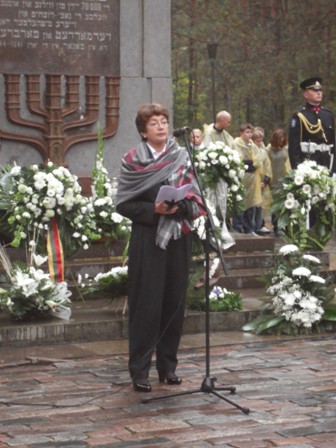 of Vilna and its environs ― were murdered by Nazi henchmen between 1941 and 1944. In 2005, Yale University Press brought out Kazimierz Sakowicz’s eyewitness account, Ponary Diary, where it is reconfirmed that most of the killing was done by volunteer local killers.
of Vilna and its environs ― were murdered by Nazi henchmen between 1941 and 1944. In 2005, Yale University Press brought out Kazimierz Sakowicz’s eyewitness account, Ponary Diary, where it is reconfirmed that most of the killing was done by volunteer local killers. Attorney Joseph Melamed, chairman of the Association of Lithuanian Jews in Israel (at right) delivered the keynote speech today at an event held at Yad Vashem in Jerusalem to mark the September 23rd anniversary of the 1943 liquidation of the Vilna Ghetto. Because of the Jewish holidays, the event was moved up to the 20th this year.
Attorney Joseph Melamed, chairman of the Association of Lithuanian Jews in Israel (at right) delivered the keynote speech today at an event held at Yad Vashem in Jerusalem to mark the September 23rd anniversary of the 1943 liquidation of the Vilna Ghetto. Because of the Jewish holidays, the event was moved up to the 20th this year.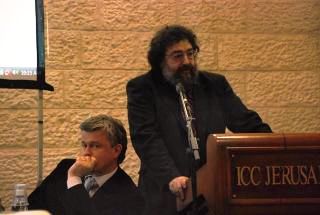
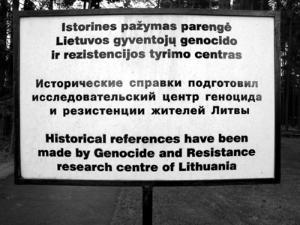
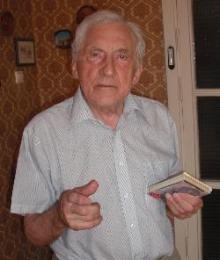
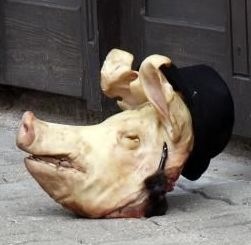 A pig’s head, adorned with a black hat and makeshift hasidic style earlocks, was placed on the pavement right outside the door, within the courtyard of the main synagogue in Kaunas, Lithuania’s second city, during Sabbath morning services. This caused profound grief to the very small congregation of survivors who pray at the city’s Choral Synagogue, the only prewar Jewish prayerhouse in town that still functions. The service was interrupted as police arrived to investigate. The Lithuanian Jewish Community
A pig’s head, adorned with a black hat and makeshift hasidic style earlocks, was placed on the pavement right outside the door, within the courtyard of the main synagogue in Kaunas, Lithuania’s second city, during Sabbath morning services. This caused profound grief to the very small congregation of survivors who pray at the city’s Choral Synagogue, the only prewar Jewish prayerhouse in town that still functions. The service was interrupted as police arrived to investigate. The Lithuanian Jewish Community